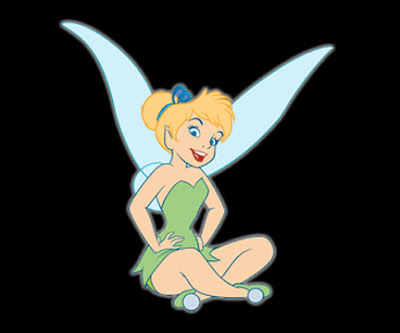Saturday, March 19
THE TINKERBELL SYNDROME
“I think I he suffers from the Peter Pan Syndrome—he just won’t grow up.”
“Yeah? I think I’ve got a case of the Tinkerbell Syndrome.”
“What’s that?”
“I think that if people don’t clap for me, I’ll die.”
-overheard on North Campus, UCLA (1996)
No, really. That’s really how the exchange went. OK, so the conversation took place between two theater majors I knew, but it still revealed a major insight into the modern mind. Approval: It’s important, but how important? And what do we use to measure the applause? I firmly believe our inner critic, however it is developed, plays a bigger role than we realize. But again, the question as to where this weight, this importance placed on approval looms large.
Take, for example, the young man in the conversation—the one who self-identifies with the character of Tinkerbell. Setting aside his homosexuality (which is difficult, considering he flames like a charcoal briquette), the reference is fascinating. It isn’t a nod to the over-commercialized, branded on every imaginable item of clothing a sweat shot could turn out version poor old Uncle Walt pimped out. No, this is a direct reflection of the original stage play, where the audience is asked to clap if they believe in magic, which will restore Tinkerbell’s life force. (OK, to add the homosexuality a woman, in most, if not all, stage versions, the title roll of Peter usually performs back in - you connect the dots.) In Laughing Wild, a wonderfully wicked stage play, there’s a recounting of a childhood trauma, more specifically, a production of “Pan” that goes awry. In it, the audience has been so shocked by the play’s poor quality (Wendy seems to be getting fatter in each scene, the alligator crawls offstage and eats a child in the first row—you know, the usual), and they’re too scared to clap. Of course, Peter screams at the audience that they killed Tinkerbell, which only adds to the trauma.
Aside from wanting to plug an incredible, dark comedic romp, I bring this up because it bears direct resemblance to what a Tinkerbell Syndrome might look like. (On a side note, I find it odd a theory developed explaining male immaturity, but no corollary ever emerged explaining female irrationality and/or moodiness, but I digress.) Blame, guilt and displaced negative emotions all factor in to the equation, most likely in an inverse manner. That is to say, if a youngster is berated and belittled all his life (whether he deserved it or not) the result is an adult specifically tuned into modes of approval that directly counter-act the negative imprint of his childhood.
Sounds simple enough, right? No, you say? Specifics would help, that’s for sure. Let’s go back to the young man from the UCLA scenario. His father, quite overweight, put an enormous amount of pressure on his son to be thin and (presumably) more athletic that his talents allowed. There wasn’t any apparent shame in his moving into the performing arts, but the now-skinny young man (a “husky” child by his own account), thrived on the physical feedback that matched his father’s patterns of approval:
“You look so thin.”
“What a thin figure you have.”
“You’re a great dancer—you make it look so athletic.”
“If you were straight, girls would be all over you!”
OK, so I threw that last one in to be a bitch, but if you knew this guy’s obsession with passing for heterosexual, you’d take the dig too. While the first three all seem generic enough, a little more personal insight betrays the deeper, darker power at work here. This particular young man and I were socially acquainted, so I was privy to some of his “inner” thoughts and private moments. (I put quote marks around ‘inner’ because these moments, like everything else in his life, were played out publicly for applause/approval.)
[NOTE: For the purposes of this essay, applause and approval are interchangeable.]
He constantly obsessed about his weight, the weight (and cock size) of the guys he dated, making everything a less-than private competition. “See? I’m skinnier than N. Look At his pants compared to mine,” he would rant, going through the other guy’s closet when they weren’t looking. Never mind that they guy in one case was a raver, and wore jeans at least four to five times larger than his actual waist size. No, this was a competition—a war declared on the world, when it was his father he was angry at.
Psychobabble? Perhaps. Mud-slinging? Mary, keep yo’ mouth shut! Scary insight into why this one individual has yet to come to peace with his inner-turmoil, find true love or lasting success in his career of choice? Only time will tell.
JG [REVISED, JANUARY 2005]
Subscribe to:
Post Comments (Atom)



No comments:
Post a Comment